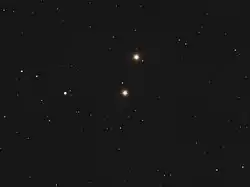 ν2 Coronae Borealis (lower red star) in optical light | |
| Observation data Epoch J2000.0 Equinox J2000.0 (ICRS) | |
|---|---|
| Constellation | Corona Borealis |
| Right ascension | 16h 22m 29.21855s[1] |
| Declination | +33° 42′ 12.5274″[1] |
| Apparent magnitude (V) | +5.396[2] |
| Characteristics | |
| Spectral type | K5 III[3] |
| U−B color index | +1.787[2] |
| B−V color index | +1.525[2] |
| Astrometry | |
| Radial velocity (Rv) | −41.1±0.2[4] km/s |
| Proper motion (μ) | RA: −5.42[1] mas/yr Dec.: +50.56[1] mas/yr |
| Parallax (π) | 5.49 ± 0.24 mas[1] |
| Distance | 590 ± 30 ly (182 ± 8 pc) |
| Absolute magnitude (MV) | −0.78[5] |
| Details | |
| Radius | 50[6] R☉ |
| Luminosity | 530[7] L☉ |
| Surface gravity (log g) | 1.76[8] cgs |
| Temperature | 3,940[8] K |
| Metallicity [Fe/H] | −0.16[8] dex |
| Rotational velocity (v sin i) | 3.1[9] km/s |
| Other designations | |
| Database references | |
| SIMBAD | data |
Nu2 Coronae Borealis is a solitary,[11] orange-hued star located in the northern constellation of Corona Borealis. It is faintly visible to the naked eye, having an apparent visual magnitude of +5.4.[2] Based upon an annual parallax shift of 5.49 mas,[1] it is located roughly 590 light years from the Sun. At that distance, the visual magnitude is diminished by an extinction of 0.1 due to interstellar dust.[12]
This is an evolved red giant star with a stellar classification of K5 III.[3] The measured angular diameter of Nu2 Coronae Borealis is 2.53±0.16 mas.[13] At its estimated distance, this yields a physical size of about 50 times the radius of the Sun.[6] Nu2 Coronae Borealis is radiating 530[7] times the Sun's luminosity from its photosphere at an effective temperature of 3,940 K.[8]
References
- 1 2 3 4 5 6 van Leeuwen, F. (2007), "Validation of the new Hipparcos reduction", Astronomy and Astrophysics, 474 (2): 653–664, arXiv:0708.1752, Bibcode:2007A&A...474..653V, doi:10.1051/0004-6361:20078357, S2CID 18759600.
- 1 2 3 4 Jennens, P. A.; Helfer, H. L. (September 1975), "A new photometric metal abundance and luminosity calibration for field G and K giants", Monthly Notices of the Royal Astronomical Society, 172 (3): 667–679, Bibcode:1975MNRAS.172..667J, doi:10.1093/mnras/172.3.667.
- 1 2 Keenan, Philip C.; McNeil, Raymond C. (1989), "The Perkins catalog of revised MK types for the cooler stars", Astrophysical Journal Supplement Series, 71: 245, Bibcode:1989ApJS...71..245K, doi:10.1086/191373.
- ↑ de Bruijne, J. H. J.; Eilers, A.-C. (October 2012), "Radial velocities for the HIPPARCOS-Gaia Hundred-Thousand-Proper-Motion project", Astronomy & Astrophysics, 546: 14, arXiv:1208.3048, Bibcode:2012A&A...546A..61D, doi:10.1051/0004-6361/201219219, S2CID 59451347, A61.
- ↑ Huang, W.; et al. (2012), "A catalogue of Paschen-line profiles in standard stars", Astronomy & Astrophysics, 547: A62, arXiv:1210.7893, Bibcode:2012A&A...547A..62H, doi:10.1051/0004-6361/201219804, S2CID 119286159.
- 1 2 Lang, Kenneth R. (2006), Astrophysical formulae, Astronomy and astrophysics library, vol. 1 (3rd ed.), Birkhäuser, ISBN 3-540-29692-1. The radius (R*) is given by:
- 1 2 McDonald, I.; et al. (2012), "Fundamental Parameters and Infrared Excesses of Hipparcos Stars", Monthly Notices of the Royal Astronomical Society, 427 (1): 343–57, arXiv:1208.2037, Bibcode:2012MNRAS.427..343M, doi:10.1111/j.1365-2966.2012.21873.x, S2CID 118665352.
- 1 2 3 4 McWilliam, Andrew (1990), "High-resolution spectroscopic survey of 671 GK giants. I - Stellar atmosphere parameters and abundances", The Astrophysical Journal Supplement Series, 74: 1075, Bibcode:1990ApJS...74.1075M, doi:10.1086/191527.
- ↑ De Medeiros, J. R.; et al. (November 2000), "Rotation and lithium in single giant stars", Astronomy and Astrophysics, 363: 239–243, arXiv:astro-ph/0010273, Bibcode:2000A&A...363..239D.
{{citation}}: CS1 maint: multiple names: authors list (link) - ↑ "nu02 CrB". SIMBAD. Centre de données astronomiques de Strasbourg. Retrieved 2017-08-25.
{{cite web}}: CS1 maint: postscript (link) - ↑ Eggleton, P. P.; Tokovinin, A. A. (September 2008), "A catalogue of multiplicity among bright stellar systems", Monthly Notices of the Royal Astronomical Society, 389 (2): 869–879, arXiv:0806.2878, Bibcode:2008MNRAS.389..869E, doi:10.1111/j.1365-2966.2008.13596.x, S2CID 14878976.
- ↑ Famaey, B.; et al. (January 2005), "Local kinematics of K and M giants from CORAVEL/Hipparcos/Tycho-2 data. Revisiting the concept of superclusters", Astronomy and Astrophysics, 430 (1): 165–186, arXiv:astro-ph/0409579, Bibcode:2005A&A...430..165F, doi:10.1051/0004-6361:20041272, S2CID 17804304.
- ↑ Richichi, A.; et al. (February 2005), "CHARM2: An updated Catalog of High Angular Resolution Measurements", Astronomy and Astrophysics, 431 (2): 773–777, Bibcode:2005A&A...431..773R, doi:10.1051/0004-6361:20042039.